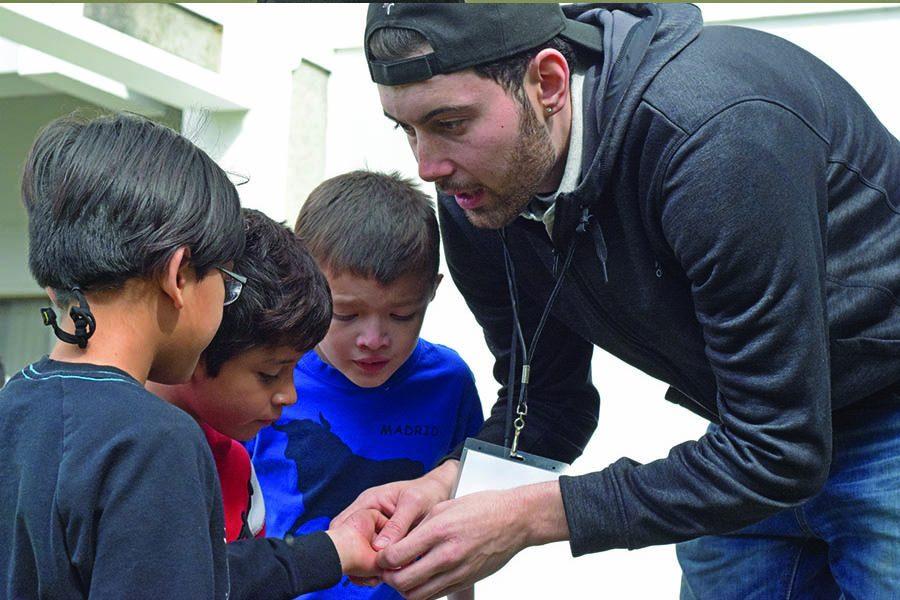Tutors establish ‘familial’ connection
METAS program extends literary, personal support
METAS tutor Tomas Chavez holds a student’s hand after plucking a thorn out of it during a break outside of the Liberal Arts Building during the bi-weekly METAS tutoring program on Saturday.
Mar 1, 2017
METAS is more than a pre-K-12 grade academic mentoring and tutoring program for Science, Technology, Engineering and Mathematics (STEM) courses. It has changed the lives of thousands.
A low roar of students fills the halls of the Applied Arts Building, every other Saturday, when METAS is in session. But step into any of these classrooms and a tutor or teacher is quick to silence the room to answer any question or open feedback from the students that needs an answer.
A fifth-grade classroom is filled with students working on homework, doing math problems and some chatter.
Gustavo Arguello, a first-semester tutor for METAS encouraged his students to just try when they feel they can’t understand a math problem.
Arguello said, “I wanted to tutor to help kids be successful. I want to give others opportunities I didn’t have.”
It’s a place that students can have a familial connection to their tutors and teachers. They can see their friends, while simultaneously improving their grades. It gives students, who may be having a trouble connecting or are nervous about their freshman year in high school, something to look forward to.
The youngest in the METAS program are the “pollitos” or little chicks, pre-K and first-grade students, aged 6 and 7, who are working on English literacy and STEM literacy.
In another classroom, ninth graders prepare to speak to eighth graders about their experiences and give advice on what to expect and how to be successful in high school.
They tell how they picked their school, how they knew the school was right for them and give some survival tips for incoming students.
Angelina Villafane and Shanina Shumate, teachers for METAS, engaged the students in a discussion about avoiding procrastinating but instead being organized.
Calvin Andrews, a ninth grade student from Summit K2, said, “Do not let school stress you out too much. Your mental and physical health comes first.”
After their discussion, students seemed to be more relaxed about their transition into high school.
Several of the students in METAS have been going since they were “pollitos.” Frank Ochoa, a ninth-grade student from Pinole Valley High School who attends Villafanes’ class, said, “I have been coming since first grade. I have friends who come and it helped me improve my grades.”
METAS and Adelante programs assistant Walter Orellano were students and tutors for the program. Orellano is responsible for outreach, applications and getting volunteer tutors.
Orellano said, “A common theme of students in METAS is that they usually become tutors in their future, some even continue and become staff at Contra Costa or in the METAS program, (HSI STEM manager) like Mayra Padilla.”
Padilla is the director for METAS. She said she is responsible for grant writing, hiring teachers, making sure all decisions made are geared toward METAS and most importantly, making sure the program stays connected to the students.
Padilla said, “METAS is a beautiful program with spirit that we have made successful over the last 30 years. We help so many young people successfully get through school.”
The program has over 250 students, six teachers and 50 tutors, more than half from CCC and the rest from other colleges like UC Berkeley, San Jose State and San Francisco State. METAS began in 1978 and continues to prosper in its 30th year.


